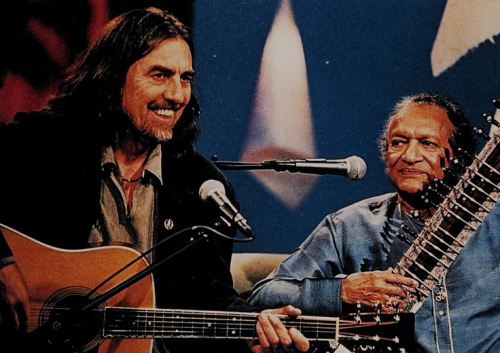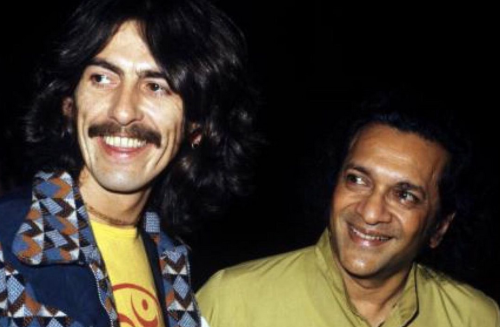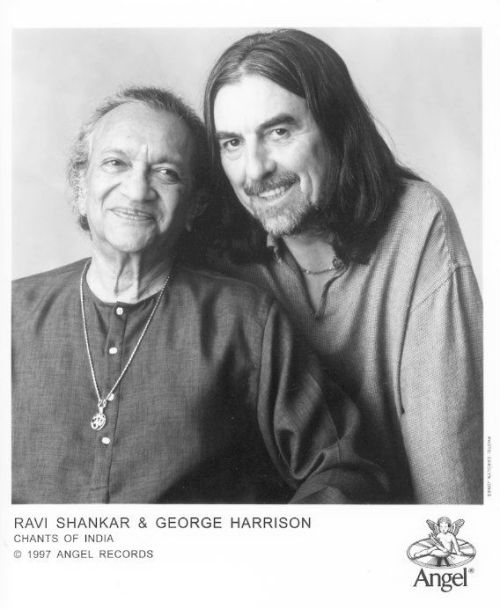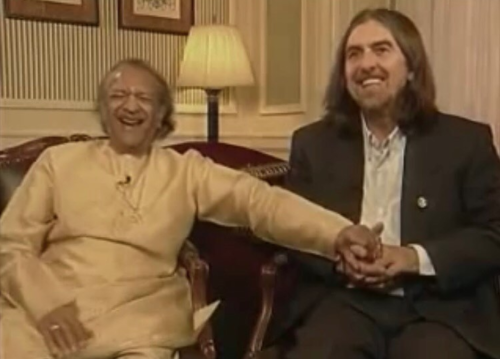#chants of india
George Harrison and Ravi Shankar appearing on VH1 for an interview conducted by John Fugelsang, 1997. Photo by Marc Bryan-Brown/Corbis Outline.
“If you want to know anything in this life, you just have to knock on that door — whether it be physically on somebody else’s door or, which I was lucky to find, is through meditation. It’s all within. Because if you think about it, there isn’t anything — I mean, in creation, the whole of creation that is perfect. You know, there is nothing that goes wrong with nature — only what man does, then it goes wrong.
But we are made of that thing, the very essence of our being, of every atom in our body, is made from this perfect knowledge, this perfect consciousness. It superimposed on that is through, if I can use that word, the tidal wave of bullshit that goes through the world. So we’re being barraged by bullshit. But not only that, the way the world is structured or the way creation is structured, we have duality which says: yes/no, good/bad, loss/gain, birth/death, and it’s this circle that you get trapped in. It’s like the Memphis blues again. And that’s the hardest thing to understand: what is causing both of these things? What is causing day and night, good and bad? It’s all the cause and this is the effect. I mean, we’re getting really transcendental here, but… our physical being is really, only a very, very subtle level it’s just like the sap in a tree is the sap and it runs throughout all parts of the tree. It’s like that. Our bodies are manifested into physical bodies but the cause, the sap, is pure consciousness, pure awareness. And that is perfect knowledge, but we have to tap into that to understand it. And that’s really why for me this record [‘Chants of India’] is important because it’s another little key to open up the within, for each individual to be able to see it, and turn off… ‘turn off your mind, relax and float downstream.’” - George Harrison, VH1, 1997 (x)
Post link
Clip from The Southbank Show, 1997.
“[After a final mixing of a track for Chants of India one] evening [George] came and embraced me with tears in his eyes and simply said, ‘Thank you, Ravi, for this music.’ His emotion meant so much to me, and my eyes filled with tears too.” - Ravi Shankar, Raga Mala(1997)
“I like producing Ravi’s music, because for me it’s educational as well as a joy to work with. It’s actually soothing to your soul, and it helps you to focus or transcend.” - George Harrison, Raga Mala(1997)
“It’s something that I believe in, and I think it’s a benefit if people, during the day, you know, everybody gets stressed out, and this music is particularly inclined to calm you down. It’s an antidote to stress.” - George Harrison, CBS This Morning, 12 June 1997
Ravi Shankar: “He is like a son to me, I mean [laughs].”
George Harrison: “Sometimes I feel like his dad as well, though. [laughs] He can be… Well, you see, with my past, with The Beatles and stuff, we were thrust heavily into the music business, whereas Ravi was, you know, doing his performances in the classical context. And so in some respects, I’ve been able to try to help him or protect him from a vicious world, you know, in terms of contracts or different things like that. In that respect I feel almost like — you know, I have a kind of guardian type of attitude toward him. But most of the time I just feel like friends, and, you know, we just feel like kids really. It’s just our bodies that are old. Inside we’re, like, six years old.” - The Southbank Show, 1997 (x)
Ravi Shankar and George Harrison, 1966; photo courtesy of Indian Express.
“‘You revered Ravi,’ [Olivia Harrison] says of the great man. ‘He carried with him that great tradition, but he was also a very modern man and had a great sense of humor.’
Partly recorded in India and partly at Harrison’s Friar Park home in Henley-on-Thames, Olivia recalls the recording sessions [for Chants of India] well. ‘Ravi was very specific about the mantras and how they were recorded and orchestrated and George really wanted people to understand the vibrations of those chants was beneficial to their well-being.’
The track on her [Songlines] playlist is a particularly poignant choice. ‘At the end of his life George said to me that all he could listen to was “Sarve Shaam,”’ Olivia remembers. ‘After all the sounds and sights and tastes you experience over a lifetime, it came down to the purity of “Sarve Shaam.”’ The piece was also performed as the opening blessing at the Concert for George memorial, held at London’s Albert Hall in 2002.” - Songlines, June 2018 (x)
Post link
George Harrison and Ravi Shankar, 1974. Photo: Picture-Alliance/Photoshot/dpa.
“‘Mangalam’ came to me while I was walking in Friar Park, George’s place, where we were recording. I was looking at the trees and the sky, and feeling very elated all of a sudden, wishing everything should be good for everyone, and it just came to me.” - Ravi Shankar, Rolling Stone, 15 May 1997
“Steve Murphy, the president of Angel Records, had heard some songs that were similar to material on ‘In Celebration,’ a Ravi retrospective that I had helped assemble last year. He suggested we go in to the studio to record more. This music, which is based on ancient Vedic chanting, I very much enjoy. And, of course, it gave me an opportunity to work with Ravi, so it made perfect sense. […]
In a way it represents the accumulation of our ideas and experiences throughout our 30-year relationship. But to put it into a slightly more commercial aspect, the record label asked us to do this and that would never have happened 15 years ago. Because of the fact of multiculturalism has become more accepted, and more people are interested in what this music offers, this project has become more commercially viable. And this music is very close to me, this is something I very much wanted to do. I actively read the Vedic scriptures and I’m happy to spread the word about what this project is all about. People also need an alternative to all the clatter in their lives, and this music provides that. Whether it’s Benedictine Monks chanting or ancient Vedic chants, people are searching for something to cut through all the clatter and ease stress.” - George Harrison, HITS, 1997 (x)
Post link
Photo by Carolyn Jones.
Q: “What did you learn musically from [George] Harrison?”
Anoushka Shankar: “Patience. We worked with a choir on Chants of India. But the recordings were difficult. The choir didn’t sing the way we had imagined it. I was totally irritated and ranted and raved that the entire choir should be kicked out and that everything had to be approached differently. George stayed calm. He simply adjusted his music to the choir and everything worked out. George took me aside later on and told me the story about the optimistic frog and the pessimistic frog. Both fell into a bucket of milk. The pessimistic frog drowned because he gave up immediately. The optimistic frog pedaled until he had turned the milk into butter and was saved. That impressed me.” - translated from ZEIT, 5 April 2016“George Harrison, whom I was very close to, told me a story when I was fifteen. It was about two frogs. He said they both fell into a pot of milk, and one of the frogs, a pessimist, gave up straight away and drowned. The other frog kept trying to jump out, even though he failed again and again. He tried for so long that eventually all his jumping and swimming churned the milk to butter, and he was able to jump neatly away. I don’t always believe there’s going to be a happy ending to every event in my life. However, I act as if there might be, as without that shred of hope I wouldn’t keep on trying, and a sad ending would therefore become a self-fulfilling prophecy.” - Anoushka Shankar (on the best piece of advice she ever received), Man’s World India, 8 December 2016 (x)
Post link
Ravi Shankar and George Harrison, 1997; photo by Carolyn Jones, © 1997 Angel Records.
Q: “This new recording is the latest product of a relationship that stretches back more than 30 years. Do you remember what it was like in the beginning?”
George Harrison: “It’s almost as though it was scripted, and all I did was follow the script. When I first got a recording of Ravi’s, a World Pacific recording, I put it on, I played it, and inside of me I had an instinctive feeling that I was going to meet him, which I did. And all the other things have been a byproduct of that relationship. I went to India to learn some music with Ravi, but my main quest was that I wanted to know about the yogis. But Ravi was like my input into it. Through him I was able to hear the best music, buy the best incense, read the best swamis, meet the best people. I was very, very fortunate to become friends with him. And consequently all the goodness that I feel has come to me in my life is a direct effect of being plugged into that Indian-ness or Indian tradition or whatever that I gained through Ravi.”
Ravi Shankar: “In the beginning, when we met back in 1966, I found him very immature, naturally, because he was very young then. But still he had tremendous passion in wanting to know about India, Indian yogis, Indian music, Indian philosophy, Indian food and all that. And through the years, I thought, you know, this too shall pass. But I introduced him to this book, ‘Autobiography of a Yogi’ by Paramahansa Yogananda, and that put him on a serious approach. Then he tried himself with Maharishi Mahesh Yogi and the Krishna people, but he always came back to me through music. In fact, it is mainly through music that I pushed him further and further, and today I find him to be so much into it, more than ever before — not in a superficial manner, but deeply into it.” - Los Angeles, 10 May 1997 (x)
Post link
Ravi Shankar and George Harrison (in a screenshot from a 1997 interview).
Q: “Westerners have been fond of Indian music since the big breakthroughs of the ‘60s — primarily via Ravi’s music — without necessarily acknowledging or even being aware that it is a classical music based upon a complex system of knowledge and performance. What do you feel are the elements that make this sometimes dense form of expression so accessible to Western ears?”
George Harrison: “You don’t have to know all about it, you just have to be open to it — to the rhythms and the sounds of it. You don’t have to know exactly how they do it. Which in some sense, I guess, is what led to the bastardization of Indian music, which, I suppose, I started back with [adding sitar to Lennon/McCartney’s] ‘Norwegian Wood.’ But, you know, all I was doing really was trying to get the sound. You can’t resist the sound of the instruments, you can’t resist the sound of Indian classical music if you’re ready to surrender to it and not judge it. Just accept it and listen to it. Which is why I got into it. It was just overpowering, in a transcendental way.” - Los Angeles Times, 10 May 1997 (x)
Post link
Ronu Majumdar and George Harrison during the recording of Chants of India, 1996; photo courtesy of Express Newsline, 1996.
“I find him a great human being who came to this planet — see I am getting goose hair already — I think he came to this planet to spread the message of love, message of humanity, and message of how you can be a very humble person after reaching heights of skies. […]
To my personal life, to my soul, he was like a little brother, not a star, not a big name, someone who I could connect to, someone I met as a great human being or as a saint, as the humblest person possible, someone I can’t even imagine that I met.” - Ronu Majumdar, BBC Radio 4 Extra, November 2018 (x)
Post link




![Photo by Carolyn Jones.Q: “What did you learn musically from [George] Harrison?” Anoushka Shankar: “ Photo by Carolyn Jones.Q: “What did you learn musically from [George] Harrison?” Anoushka Shankar: “](https://64.media.tumblr.com/eeebd5a0efb74241536aa1dd3d8ecce2/8f64d83da21787db-a6/s500x750/4f9f7c6fd8337edcb8d78a2fb1da07cd7fdc505f.jpg)


